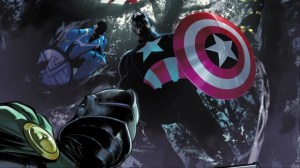
Warhammer 40,000 is an intimidating game. The mythology is massive and the miniatures too many to count, so how can one be introduced to such an overwhelming property? Warhammer 40,000: Marneus Calgar #1 provides a pretty good answer. It is by no means a perfect comic book, but considering the enormity of the world it seeks to present, these 24 pages offer readers plenty to examine without overwhelming them with details. The key to that approach lies on how it utilizes the singular perspective of its eponymous protagonist: Marneus Calgar.
Videos by ComicBook.com
As an outsider to the property, writer Kieron Gillen and artist Jacen Burrows present Warhammer 40,000 as an amoral universe defined by warfare. There are no heroes or villains in the distant future of humanity, merely those capable of surviving an endless cycle of bloodshed that thrives upon religious zealotry, absurd manipulations of science (both biological and technological), and a willingness to apply a utilitarian lens to every scenario. Marneus Calgar stands at the peak of all these facets and that makes his perspective useful. At no point in the pages of issue #1 is that usefulness confused with idolization, though.
Burrows’ career has been defined with similar scenarios, ranging from the impending madness of Lovecraftian horrors in Providence to the bloody, unsatisfying fruits of modern warfare in Punisher: Soviet, his clean lines and disturbingly familiar depictions of humanity make an excellent match for this subject matter. Every panel of violence is defined by carnage, beginning with a three panel sequence that focuses on the technology of a singular bullet and ends with the exploding viscera of a human being. There are no moral considerations surrounding the path of that single bolt as it ends life in a moment, and the terrible meaning of this one moment is expanded in the following splash. As Calgar’s life is provided with additional context, Burrows never lionizes his actions. Instead, subtle smiles and quick actions make his seemingly human face seem more human (or humanity seem increasingly alien). Even as violence interrupts the introduction in only brief bursts, it seems far worse than the obvious and immediate terrors that permeate the pages of a comic like Crossed.
Gillen utilizes Marneus’ perspective as a useful entry point into a science-fiction story that has far more in common with Dune than Star Wars. The immense weight of history can be felt in maps and infographics, but Marneus’ point of view both in the present and past focuses a sprawling mythos into something manageable. In the present that means a forever war, while in the past it shows the strenuous recruitment process for soldiers who die in waves. His accomplishments are all framed by the implicit question of “To what end?” that is left purposefully unanswered. It is not only effective in allowing readers to grapple with what essential questions a story like this can answer, but also never giving the false impression that it contains heroes or lessons.
Warhammer 40,000: Marneus Calgar never confuses nihilism with meaning. Its protagonist is neither hero nor anti-hero, but a force who captures the tone of a world whose inertia ensures only endless suffering. This may not be appealing to many new readers, but it is succinct and accurate in its definition. No novice to the concept will walk away with misconceptions about what they are reading and, while many of Burrows’ sequences are thrilling, they should not leave readers smiling. Whether Burrows and Gillen can craft this world into a meaningful statement remains an open question, but they successfully introduce it here and make enough sense of its unique horrors to encourage readers to continue.
Published by Marvel Comics
On October 14, 2020
Written by Kieron Gillen
Art by Jacen Burrows
Colors by Java Tartaglia
Letters by Clayton Cowles
Cover by Jacen Burrows and Dave Stewart








